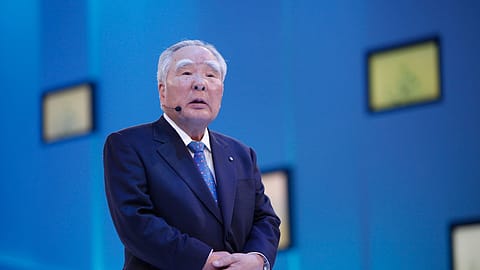Osamu Suzuki honoured with Padma Vibhushan; son Toshihiro says India was his father’s second home
Osamu Suzuki’s long and eventful life took him from being a loan officer to helming one of Japan’s largest automakers, where he played a pivotal role in making car ownership accessible to India’s burgeoning middle class.

Osamu Suzuki, the late-chairman of Suzuki Motor Corporation—and the CEO when the company forged a joint venture with the public sector Maruti Udyog Limited—has been posthumously conferred with the Padma Vibhushan, the second-highest civilian award, on Tuesday. After the gazette was made public, his son, Toshihiro Suzuki, president, Suzuki Motor Corporation, said that his late father would be looking back fondly on the 45 years he spent with India, which was his second home.
“This award goes not only to my father, but also to all the people, who have worked at Suzuki and Maruti Suzuki. My father must be feeling very proud today,” said Toshihiro Suzuki, who took the helm from his father in 2015. Osamu Suzuki was conferred for his dedication towards the development of the automotive industry and demonstrating exceptional leadership and initiative. He previously was conferred with the Padma Bhushan in 2007.
Born in 1930 in the Gifu Prefecture, he graduated from Chuo University in 1953. Suzuki began working as a loan officer in a local bank. However, his life took an unexpected turn when he married Shoko Suzuki, the granddaughter of the patriarch of Suzuki Motor Corporation, Michio Suzuki. As the Suzuki family did not have a male heir, following the Japanese custom, Osamu took up the family name of Suzuki, to become Osamu Suzuki, becoming the fourth adopted son to run the company.
Climbing through the corporate ladder at his adopted family’s organisation, in 1978, Suzuki became the president and CEO of the company. It was around this time when Suzuki, helming a relatively smaller carmaker, came across a contingent of Indian bureaucrats, led by RC Bhargava, Maruti Suzuki’s present chairman. The contingent had been running pillar-to-post, knocking on the doors of established carmakers to find a foreign collaborator to roll out an affordable car on Indian roads by 1983.
Such was the entrepreneurial zeal and dynamism of Suzuki, that he went against the advice of many, including the Japanese embassy in India, to forge a collaboration that went on to become Maruti Suzuki, India’s largest maker of passenger vehicles, and laid the foundation of Indo-Japanese business relationships. In February 2021, he stepped down from the role of chairman to remain as a senior advisor, a role he held till his death in December last year.
